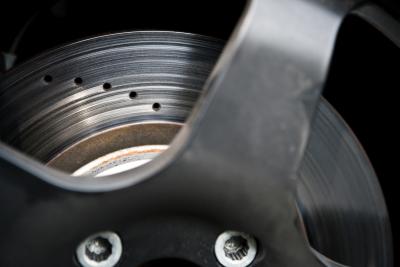
Rims are an easy upgrade for your car, but many people only consider the aesthetics when upgrading their rims while neglecting to consider the other measures that create a good rim. When shopping for new rims with the idea of increasing performance, you must consider a few design variables that can affect it. These considerations make you a savvy shopper whose rim purchase can increase the curb appeal of your car while also having a positive affect on performance.
Upgrading your steel or standard aluminum alloy rims to a set of lightweight alloy rims offers a two-fold performance advantage for your car. Lightweight rims reduce your car's unsprung weight -- the amount of weight not suspended by the car's suspension system. Lowering your car's unsprung weight allows the suspension to more quickly react to minor road imperfections without the suspension packing up over stutter bumps. Lighter rims also increase your car's apparent horsepower by reducing the weight that the driveshaft has to spin; the decreased rotating mass means your car is making more efficient use of the engine's horsepower.
The size of your rims can alter the profile appeal of your car while also increasing performance and creating more desirable handling characteristics. Wider rims allow you to run wider tires; wider tires give your car more contact area with the street, giving you increased grip for better acceleration and braking. Rims with a larger diameter can be fitted to low-profile tires while still maintaining the same overall wheel diameter. This setup reduces the height of your tire's sidewall, increasing tactile feedback and giving you a more precise feel of the road. Low-profile tires also reduce the risk of tire fold during hard cornering, giving your car more predictable cornering and increased safety.
Upgrading from steel to aluminum alloy rims, or upgrading from entry-level aluminum alloy rims to high-performance lightweight aluminum alloy rims, can increase wheel rigidity. Aluminum alloy rims flex less than steel rims under heavy loads. Increased wheel rigidity reduces wheel and tire deflection during hard cornering maneuvers since the rim is stiffer. This gives you a more precise feel of the road and allows you to carve sharper lines through twisty roads.
The design of the rim's surface can also affect the performance of your car. Aluminum alloy is a better conductor of heat than steel, which makes alloy wheels a tool for heat dissipation; under very hard braking or during periods of extended brake application, brakes heat up and develop brake-fade, minimizing the usefulness of the brakes. Aluminum alloy rims can reduce the brake-fade effect. Brakes with an airy design with multiple openings also can increase the flow of air onto the brake rotors, which can cool the rotors and lessen the effects of brake-fade.